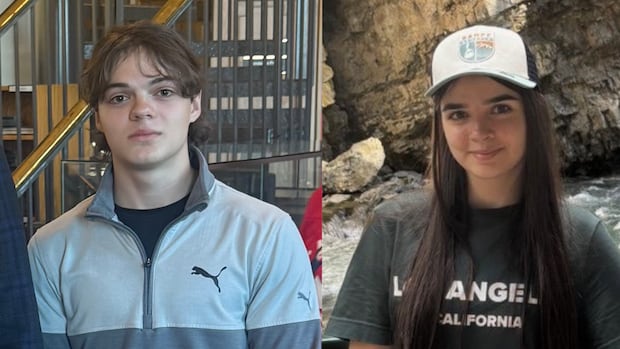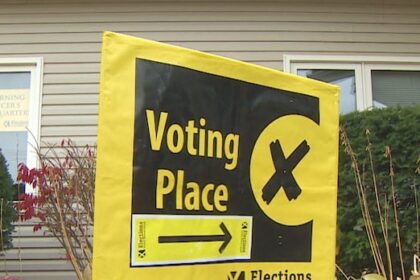SaskatchewanUkrainian students in Saskatchewan are urging the province to renew a tuition deal that lets them pay domestic student rates. The program is scheduled to expire in 2026, leaving many uncertain whether they can afford to stay in school. A funding deal keeping universities affordable for Ukrainian students is scheduled to expire in 2026Aishah Ashraf · CBC News · Posted: Nov 12, 2025 9:00 AM EST | Last Updated: 14 minutes agoListen to this articleEstimated 4 minutesThe audio version of this article is generated by text-to-speech, a technology based on artificial intelligence.Ivan Teteria, left, and Solomiia Kulyk are first-year students at the University of Saskatchewan. (Submitted by Ivan Teteria, Solomiia Kulyk)When Ivan Teteria walked across the University of Saskatchewan campus for his first week of classes this fall, it felt like proof that everything he’d worked for was finally paying off.Three years earlier, as the war in Ukraine escalated, he left home and arrived in Regina as a 15-year-old, unsure of the life ahead of him. In a new city, he tried to rebuild a sense of normalcy with school, friends and a future he could plan for.That future proved to be within reach with the help of a Saskatchewan program allowing Ukrainian students who fled the war to pay the same tuition as Canadians. Now a first-year politcal science student, Teteria worries that door could soon close.”People who are sincerely concerned about their future don’t need ‘could bes’ or ‘maybes,'” Teteria said. “They need certainty — certainty that we don’t unfortunately have.”Saskatchewan’s Ukrainian student tuition agreement, funded jointly by the province and federal government, is scheduled to expire March 31, 2026.Created after Russia’s 2022 invasion, the program allows students from Ukraine to study at Saskatchewan post-secondary institutions without paying international fees that can reach an annual cost of $60,000 — and even higher for a few specialized programs. The province insists the agreement hasn’t been cancelled — only that it hasn’t yet been renewed.But students say they learned through letters from their university that winter 2026 would be the last term covered under the current deal.The letter, sent in June, confirms tuition support for students from Ukraine is only guaranteed until winter 2026. (Submitted by Solomiia Kulyk)For many, that uncertainty overshadows everything else.Fears over rising costsTeteria says he’s already hearing from Ukrainian high-school students who are reconsidering university altogether. “We have high schoolers not even applying.… They do not have the means to afford the crazy international tuition rates,” he said. “I’ve had desperate parents contact me and ask, ‘What do we do? How do we fix this issue?'”The worry feels just as heavy for Solomiia Kulyk, a first-year business student at the University of Saskatchewan.She came to Regina from Ukraine in 2024 and calls the program her reason for being able to stay in school.Solomiia Kulyk on campus. (Submitted by Solomiia Kulyk)She currently pays about $10,000 a year under the domestic rate. Without it, she says, her tuition would quadruple.”If we don’t get our permanent residency by the fall term … we would not be able to continue our studies,” she said. “We cannot pay that international amount in university.”Both students say the issue is about more than just money — it’s about whether the lives they’re creating in Saskatchewan can last.”I’m planning to build my future in Canada, to pursue a degree and then work for it, to pay taxes, as every Canadian [does],” said Kulyk. But she says in order to do so, she needs answers.Calls for renewal Earlier this month, Teteria and Kulyk were among several students who attended the Saskatchewan Legislature, listening from the gallery as their situation was raised on the floor.That same afternoon, Opposition MLAs pressed the government to act.”Some of these students fled communities that don’t exist anymore — they came here seeking shelter and hoping to build a future in Saskatchewan,” said Keith Jorgensen, the NDP MLA for Saskatoon Churchill-Wildwood. “We’re not talking about a lot of money. This small investment helps these students complete their education, get good jobs and contribute to Saskatchewan’s economy.”Ivan Teteria at the Saskatchewan Legislative Building. He says until a decision on the tuition program is made, his future feels like it’s on pause. (Submitted by Ivan Teteria)The provincial government says about 26 students are receiving support through the agreement, with Saskatchewan contributing about $300,000 per year.Advanced Education Minister Ken Cheveldayoff says the deal remains in place for the time being, and that discussions with Ottawa will happen before it expires.”We’re proud of the program in place, and we will be looking to the future to ensure that there are similar type programs going forward,” he said. Teteria says that until a decision is made, his future feels like it’s on pause.”We just have to rely on the government and hope that they finally extend the program as soon as possible,” he said. ABOUT THE AUTHORAishah Ashraf is a reporter with CBC Saskatchewan, based in Prince Albert. You can send story ideas and tips to aishah.ashraf@cbc.ca.
Ukrainian university students who fled war get a tuition break in Sask. That could soon change











